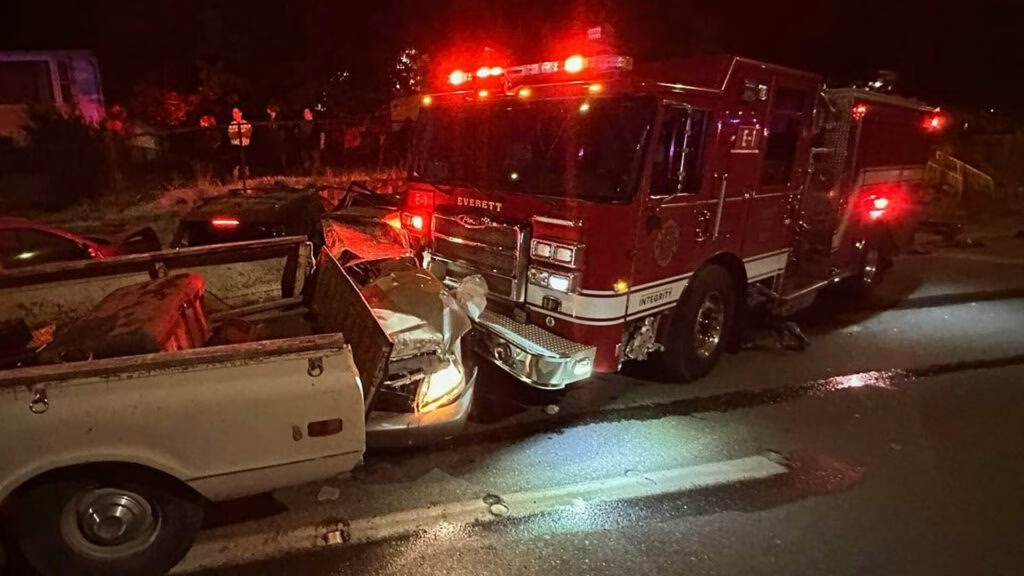How Did a Fire Truck End Up Stolen in Everett, Washington?
Friday night in Everett, Washington, took a wild turn that nobody saw coming. The Everett Fire Department had just wrapped up a medical emergency on the fifth floor of an apartment building. When the crew returned to their truck on Hoyt Avenue, it was gone. Not just misplaced—stolen. Imagine the shock. Firefighters, who are used to being the rescuers, suddenly found themselves victims of a crime that would soon spiral into chaos.
What Happened After the Fire Truck Was Taken?
The thief didn’t just take the fire truck for a joyride. Instead, they barreled through the neighborhood at high speeds, turning the massive 2018 Pierce Enforcer Pumper into an unlikely battering ram. Within minutes, 911 calls started pouring in. First, reports of a hit-and-run involving two parked cars. Then, another call—this time, the fire truck had plowed into ten more vehicles. By the time police caught up, the damage was staggering: 14 parked cars hit, landscaping torn up across five locations, and the fire truck itself battered and out of commission.
Which Vehicles Were Damaged, and How Bad Was It?
The aftermath looked like something out of a demolition derby. One Chevrolet Camaro had its door ripped clean off. An early Lexus RX was nearly unrecognizable. Other vehicles along the route bore the scars of the rampage—dented panels, shattered glass, twisted metal. The fire truck, designed to withstand emergencies, was itself so badly damaged that it had to be impounded as evidence. For the Everett Fire Department, this meant pulling a reserve engine into service just to keep up with calls.
How Did the Community and Authorities Respond?
The suspect ditched the fire truck and fled on foot, leaving behind a trail of destruction and a lot of unanswered questions. Everett Police Chief John DeRousse didn’t mince words: losing a fire engine to such recklessness puts both first responders and the community at risk. The department immediately called on residents for tips, emphasizing that any information could be crucial in tracking down the person responsible.
Fire Chief Dave DeMarco echoed the concern, noting that the department is reviewing its policies and procedures to prevent anything like this from happening again. He also expressed relief that, despite the chaos, no one was injured—a small mercy in an otherwise disastrous night.
Why Are Stolen Emergency Vehicles So Dangerous?
Stealing any vehicle is risky, but a fire truck? That’s a whole different level. These are massive, heavy machines—often weighing 30,000 pounds or more—built for stability and power, not agility. When someone unfamiliar with their controls takes the wheel, the results can be catastrophic. According to the National Fire Protection Association, fire trucks are involved in thousands of crashes each year, but theft is rare. When it does happen, the potential for harm skyrockets. Not only are lives endangered, but critical emergency resources are taken out of service, leaving the community more vulnerable.
What Can Be Done to Prevent Incidents Like This?
This incident has prompted a lot of soul-searching for fire departments everywhere. While it’s standard practice to leave engines running during emergencies (to keep equipment powered and ready), this also makes them easy targets. Some departments are now looking into advanced anti-theft systems, remote engine shut-offs, or even dedicated security personnel at major scenes. Training and public awareness campaigns can also help, reminding everyone that these vehicles are lifelines, not playthings.
What’s Next for Everett and Its First Responders?
The Everett Police Department continues to investigate, asking anyone with information to come forward. Meanwhile, the fire department is doing what it always does—adapting, learning, and serving the community. The city’s quick pivot to a reserve engine shows just how resilient first responders can be, even in the face of unexpected setbacks.
The big takeaway? Community safety isn’t about perfection—it’s about smarter adjustments. Start with one change this week, whether it’s locking up valuables or staying alert in your neighborhood, and you’ll likely spot the difference by month’s end.

